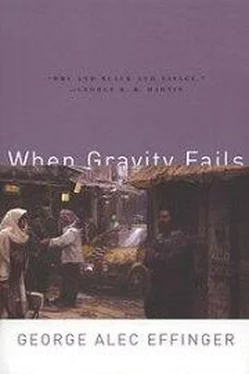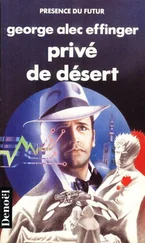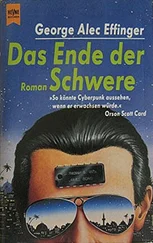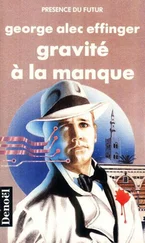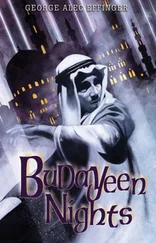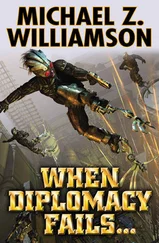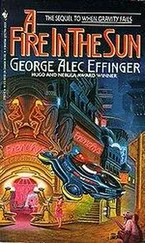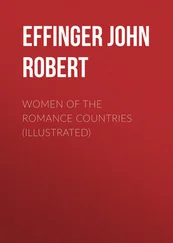“That is well,” said Friedlander Bey. “Your doubts will keep you alive longer.”
I really wished he hadn’t added that last word; he sounded as if I couldn’t survive, no matter what I did, but my doubts would keep me around to watch myself suffer. “It will be as Allah wills,” I said.
“May the blessing of Allah be on you. Now we must discuss your payment.”
That surprised me, too. “I had no thought of payment,” I said.
Papa acted as if he did not hear. “One must eat,” he said simply. “You shall be paid a hundred kiam a day until this affair is concluded.” Concluded is right: until either we put an end to the two murdering sons of bitches, or one of them put an end to me.
“I did not ask for such a wage,” I said. A hundred a day; well, Papa had said one must eat. I wondered what he thought I was accustomed to eating.
Again he ignored me. He gestured to the Stone That Speaks, who approached and handed Friedlander Bey an envelope. “Here is seven hundred kiam,” Papa said to me, “your pay for the first week.” He gave the envelope back to the Stone, who brought it to me.
If I took the envelope, it was a symbol of my complete acceptance of Friedlander Bey’s authority. There would be no turning back, no quitting, no ending but the ending. I looked at the white envelope in the sandstone-colored hand. My own hand rose a little, sank a little, rose again and took the money. “Thank you,” I said.
Friedlander Bey looked pleased. “I hope it brings you pleasure,” he said. It had damn well better; I was certainly going to earn every fuckin’ fiq of it.
“O Shaykh, what are your instructions?” I asked.
“First, my nephew, you must go to Lieutenant Okking and put yourself at his disposal. I will inform him that we will cooperate completely with the police department in this matter. There are circumstances that my associates can manage with greater efficiency than the police; I’m sure the lieutenant will acknowledge that. I think that a temporary alliance of my organization with his will best serve the needs of the community. He will give you all the information he has on the killings, a probable description of the one who cut the throats of Abdoulaye Abu-Zayd and Tamiko, and whatever else he has so far withheld. In return, you will assure him that we will keep the police informed of such facts as we uncover.”
“Lieutenant Okking is a good man,” I said, “but he cooperates only when he feels like it, or when it’s clearly to his advantage.”
Papa gave me a brief smile. “He will cooperate with you now, I will make sure of that. He will soon learn that it is, indeed, in his own best interest.” The old man would be as good as his word; if anyone could persuade Okking to help me, it was Friedlander Bey.
“And then, O Shaykh?”
He cocked his head and smiled again. For some reason I felt cold, as if a bitter wind had found its way into Papa’s fortress. “Do you foresee a time, my nephew,” he asked, “or can you imagine a circumstance, in which you would seek the modifications you have so far rejected?”
The icy wind blew more fiercely. “No, O Shaykh,” I said, “I can’t foresee such a time or imagine such a situation; that doesn’t mean that it may not happen. Perhaps sometime in the future I’ll have need to choose some modification.”
He nodded. “Tomorrow is Friday, and I observe the Sabbath. You will need time to think and plan. Monday is soon enough.”
“Soon enough? Soon enough for what?”
“To meet with my private surgeons,” he said simply.
“No,” I whispered.
Suddenly, Friedlander Bey ceased being the kindly uncle. He became, instantly, the commander of men’s allegiance, whose orders cannot be questioned. “You have accepted my coin, my nephew,” he said sternly. “You will do as I say. You cannot hope to succeed against our enemies unless your mind is improved. We know that at least one of the two has an electronically augmented brain. You must have the same, but to an even greater degree. My surgeons can give you advantages over the murderers.”
The two sandstone hands appeared on my shoulders, holding me firmly in place. Now, truly, there was no way out. “What sort of advantages?” I asked apprehensively. I began to feel the cold sweat of utter fear. I had avoided having my brain wired more out of profound dread than principle. The idea produced terror in me, amounting to an irrational, paralyzing phobia.
“The surgeons will explain it all to you,” said Papa.
“O Shaykh,” I said, my voice breaking, “I do not wish this.”
“Events have moved beyond your wishing,” he replied. “You will change your mind on Monday.”
No, I thought, it won’t be me; it will be Friedlander Bey and his surgeons who will change my mind.
Lieutenant Okking’s out of his office at the moment,” said a uniformed officer. “Can I help you with something?”
“Will the lieutenant be back soon?” I asked. The clock above the officer’s desk said almost ten o’clock. I wondered how late Okking was going to work tonight; I had no desire to talk to Sergeant Hajjar, whatever his connection to Papa. I still didn’t trust him.
“The lieutenant said he’d be right back, he’s just gone downstairs for something.”
That made me feel better. “Is it all right if I wait in his office? We’re old friends.”
The cop looked at me dubiously. “Can I see some identification?” he asked. I gave him my Algerian passport; it’s expired, but it’s the only thing I own with my photograph on it. He punched my name into his computer, and a moment later my whole history began spilling across his screen. He must have decided that I was an upright citizen, because he gave me back my passport, stared up into my face for a moment, and said, “You and Lieutenant Okking go back a ways together.”
“It’s a long story, all right,” I said.
“He won’t be another ten minutes. You can take a seat in there.”
I thanked the cop and went into Okking’s office. It was true, I had spent a lot of time here. The lieutenant and I had formed a curious alliance, considering that we worked opposite sides of the legal fence. I sat in the chair beside Okking’s desk and waited. Ten minutes passed, and I began to get restless. I started looking at the papers piled in hefty stacks, trying to read them upside-down and sideways. His Out box was half-filled with envelopes, but there was even more work crammed into the In box. Okking earned whatever meager wages he got from the department. There was a large manilla envelope on its way to a small-arms dealer in the Federated New England States of America; a handwritten envelope to some doctor in the city; a neatly addressed envelope to a firm called Universal Exports with an address near the waterfront — I wondered if it was one of the companies Hassan dealt with, or maybe it was one of Seipolt’s; and a heavily stuffed packet being sent to an office-supplies manufacturer in the Protectorate of Brabant.
I had glanced at just about everything in Okking’s office when, an hour later, the man himself appeared. “Hope I haven’t kept you waiting,” he said distractedly. “What the hell do you want?”
“Nice to see you, too. Lieutenant. I’ve just come from a meeting with Friedlander Bey.”
That caught his attention. “Oh, so now you’re running errands for sand-niggers with delusions of grandeur. I forget: is that a step up or a step down for you, Audran? I suppose the old snake charmer gave you a message?”
I nodded. “It’s about these murders.”
Okking seated himself behind his desk and gazed at me innocently. “What murders?” he asked.
Читать дальше
